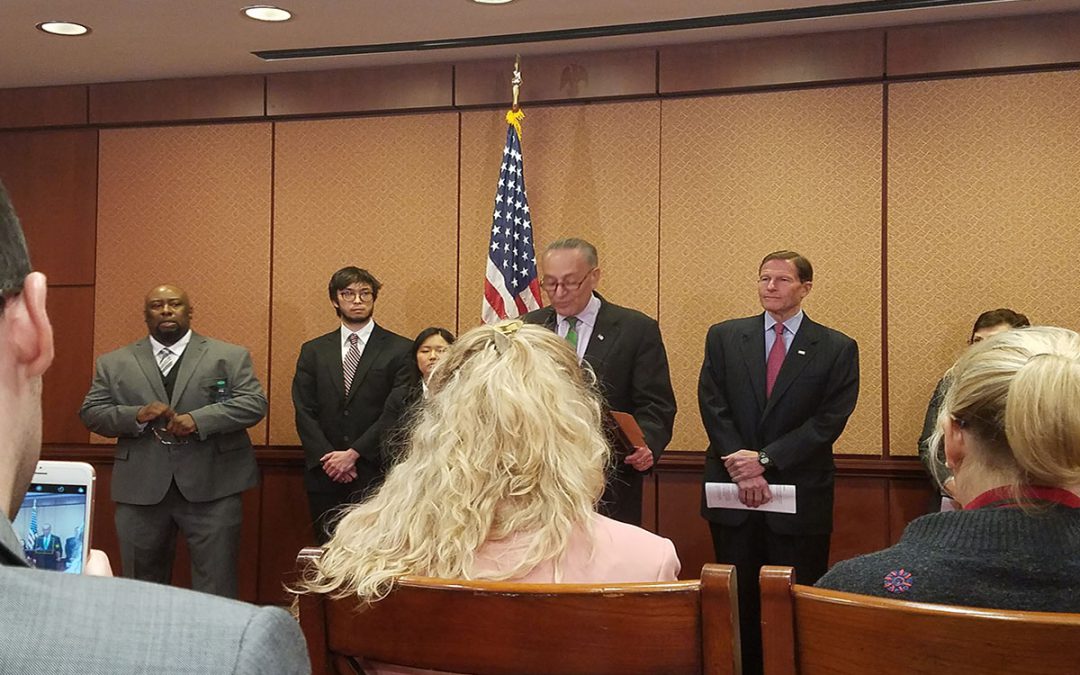Less than a week before scheduled confirmation hearings for Supreme Court nominee Neil Gorsuch, Senate Minority Leader Chuck Schumer described Gorsuch as having a conservative bias and being out of touch with ordinary Americans.
“Judge Gorsuch may act like a neutral, calm judge, but his record and his career clearly show he harbors a right-wing, pro-corporate, special interest agenda,” Schumer said in a news conference on Wednesday. “He enacted it time and time again on the 10th Circuit and if given the chance, I have no doubt that he would do it again on the Supreme Court.”
Schumer alluded to a New York Times report Wednesday that describes the connection between Gorsuch and Philip Anschutz, a Colorado billionaire and frequent conservative donor.
Schumer of New York was joined by fellow Democrat, Sen. Richard Blumenthal of Connecticut and four people who were connected to judicial cases that Gorsuch oversaw during his time on the 10th Circuit Court.
“He expresses a lot of empathy and sympathy for the less powerful, but when it comes time to rule, when the chips are down, far too often he sides with the powerful few over everyday Americans trying to just get a fair shake,” he added.
The four individuals presented by Schumer said they had been negatively affected by rulings Gorsuch made in their cases. One of them, Alphonse Maddin, a former truck driver, said he had sued his former employer, TransAm Trucking, after being fired. Maddin said he had abandoned his truck and cargo after a brake malfunction and an hours-long wait for a repair vehicle in freezing temperatures. Maddin said his employer had wanted him to stay with the trailer, but he instead sought shelter after he began to experience health problems from the frigid weather. He later returned and, in his own words, “completed my job” but the company still terminated him.
“In my opinion, clearly their cargo was more important than my life,” Maddin said.
Maddin’s suit against TransAm Trucking led to a seven-year legal battle, culminating with an appearance before Gorsuch.
“Seven different judges heard my case, one of those judges found against me,” Maddin said. “That judge was Neil Gorsuch. Fortunately, two other judges on the appeal panel decided in favor of my case and ultimately I was victorious.”
Another of the witnesses, Katherine Kwang, accompanied by her brother David, spoke about their mother who was a professor at Kansas State University. Their mother had been diagnosed with leukemia and took a sick leave from her job. At the end of her leave, doctors warned against returning to campus right away due to a flu outbreak and the risk for her compromised immune system.
“She was told that she had a week to show up or they would force her to resign or fire her. This decision to protect her health cost my mom her job,” said Kwang.
Kwang’s mother sued her employer after they refused to extend her sick leave and fired her. Gorsuch ruled in favor of the university.
“When Judge Gorsuch issued his ruling, he didn’t think about the impact that this had on our family. Our only source of income was lost. We had to rely on loans from friends, disability and jobs my brother and I had,” Kwang said.
Gorsuch’s confirmation hearing before the Senate Judiciary Committee is scheduled for March 20. Schumer said that he would consider testimony presented at the hearings before making a final decision on whether to vote in foavor of Gorsuch. He indicated, however, that he had doubts.
“These rulings that Judge Gorsuch made would probably please Mr. Anschutz, please the Heritage [Foundation] and maybe probably please the Federalist Society,” Schumer said. “It would not please the American people, should not please the Senate, no matter what someone’s ideology is.”

